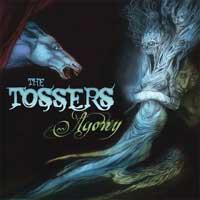
The Tossers
Agony (2007)
GlassPipeMurder
Having released a handful of albums on Windy City label Thick Records since 2000, Chicago's the Tossers didn't break out to national awareness until 2005's release of The Valley of the Shadow of Death on another hometown label, Victory Records. The album was, by most measures, an undeniable disappointment. Despite a few strong tracks in "A Criminal of Me" and "Good Morning Da", the result was an overall underachievement.
Agony is the embodiment of a 180 degree reversal of the failures of The Valley of the Shadow of Death. Throughout 17 songs, the Tossers demonstrate an otherworldly command of structure, style, and substance. The album stays lively and entertaining, as a great variety of rhythms, instrumentation, and lyrical themes are employed, spaced flawlessly within the context of the record, which doesn't drag for an instant. Most impressively, throughout 17 songs, the Tossers make it all look easy.
The album opens with an ominous, rolling pulse and a solitary jangling note of the mandolin invoking images of the opening sequence of "Gangs of New York." The vocals of T. Duggins rise above the drone of the instruments, spitting his introduction as the music rises again and bursts into the first of many jig-danceable rounds throughout the album. The second track, "Pub and Culture" starts out with a sunny, shimmering opening that erupts into a verse of whirling stringed instruments that follow the vocals up and down the scale during the chorus.
After the vigorous first two songs, "Shade" offers a breather in the ballad-y acoustic solo. Where The Valley of the Shadow of Death extended such slower numbers uncomfortably long, "Shade" is a minute and fifty-four seconds long. Before you know it, the frantic "Did It All for You" is whistling through the speakers and the energy is flowing once again.
The standout "Siobahn" features the traditional stomping Celtic rhythm with one of the best melodies on the album, while the next track "Traps and Ultimatums" features impressive violin playing, and the tin whistle work of Aaron Duggins grabs the lead in "Claddagh." "Leopardstown Races" is one of the catchier numbers, tossing out an amusing anecdote that leaves the singer spending all his money on whiskey and horse-racing.
Not all of the songs are lighthearted stories of fun and misfortune, however. "Not Alone" expresses grippingly real and exposed feelings that most artists -- particularly male -- shy away from, with vocals low and reflective above a droning bassline and steady drums pounding like fists on a wall: "There are many things I know I have done to help me to survive / But I will never tell anyone as long as I am alive / It seems at times there is no way out, not any way to escape / Because of abuse and turmoil and trauma and of rape / I feel eyes upon me every minute of the day / Hiding all around me, I turn my head away / I've seen them in my bedroom when I am exhausted and done / I've been seeing them for years, but I've never told anyone / I am walking into doors and walls âcause I am not all there / I've split from a reality of what I didn't want to share."
On the aptly titled "Political Scum," Duggins eloquently lashes out at the culture of war and its White House devotees: "Over the sea and far away our kids die in deserts âcause they've been sent that way / To guard oil rigs where the headcutters reign and blow them away without any refrain / [â¦] / Do you really believe in the stories you tell? How Christ turned his cheek or came down from the hill / When you profiteer or ransack with the soldiers you kill? / Are you upward bound or will you burn in hell?"
"The Nut House" is an autobiography of a troubled kid who's sent away by his parents, and features extraordinary violin playing by Ms. Rebecca Brooke. The album closes fittingly with "Be," an uplifting and inspiring track that offers, "You can be what you want to be / You can be whatever you see / Whatever in this world makes you happy / Don't listen to them, listen to me / I don't care whatever you do / I just care that you'll be true / If you want to be a cowboy, that's what you'll do / There's a horse somewhere waiting for you."
With the immense amount of energy in Agony, it takes a while to recognize that the Tossers have created a magnum opus of punk rock entirely excluding the use of electric guitar and the typical Irish tough-guy posturing. The frenetic rhythms, layers of precision musicianship, and thoughtful, engaging songs of protest and reflection come together for an album that remains just as fun as it is provocative. In simple summation, Agony is a masterful achievement by any standard.